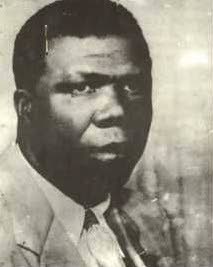APT James and the art of political representation

Dr Rita Pemberton
According to the Locard principle of Forensic Science, every contact leaves a trace. The APT James contact has left an indelible trace on life and politics of Trinidad and Tobago, the full extent of which is yet to be fully recognised.
At the launch of the first of the two new fast ferries to service the sea bridge between Trinidad and Tobago, Prime Minister The Hon Dr Keith Rowley said children should be taught about Alphonso Philbert Theophilus James – the man after whom the ship is named – in the schools. In fact, Dr Rowley said everyone should know about James.
There is indisputably a national need for the education system to afford children the opportunity to learn about the outstanding citizens of TT. And it is essential that every school child be made aware of the extent of James’ labours for the welfare of his constituents in Tobago and for the working class in this country. The ways in which James conducted himself as a politician and how he discharged his political responsibilities over the fourteen year period of his stewardship should also be taught.
On the national level, the historical narrative should credit James for his role in the activities of the 1930s alongside labour leaders Cpt Arthur Cipriani and Uriah Butler and his contribution to the development of the labour movement particularly during the period when Butler was absent.
It is hoped that the required curriculum changes would be made to allow such a policy to be implemented sooner rather than later. However, it must be indicated the utility of the political sojourn of APT James extends beyond the school system and should embrace the wider public and is of specific value to politicians, aspirants to political office and those seeking leadership positions.
The wider population should be equipped with knowledge of the characteristics James displayed as a representative of the people. So that, rather than rely on emotion which makes people easily swayed, they can empowered to assess the people who present themselves for office and select those most likely to provide effective representation and make decisions in their best interest.
In this regard, attention should be given to the length of time he achieved and maintained popular support and who, despite his cold reception in the legislature, sought the interest of all workers in the country regardless of ethnicity.
It is not clear what, if any, training is offered to prepare people that want to enter politics for the tasks that would be expected of them. But the island’s political administration stands to benefit if every politician, particularly those in Tobago, is exposed to James’ political style which is defined by some of the most desirable qualities for effective political leadership.

His first notable trait was the level of commitment he displayed to political representation. His operating style as the representative of the people of Tobago clearly demonstrates that James sought neither money, power, nor the fineries of office from political position. He did not seek to deceive or manipulate people and his focus remained fixed on improving the quality of life of his constituents, the development of Tobago and the welfare of the country’s workers.
He moved around Tobago like any other resident without fanfare. In order to represent his constituents effectively, he kept touch with all of them. He traversed all communities across the island to obtain first-hand information about their problems.
He spoke to people on the ground, investigated their stories and verified the information before he acted. When not out of the island on official business, he visited his constituents regularly and did not confine his presence to election time. His office hours were rather informal – any time, any hour and any place. His house or yours. He was not averse to meeting people in their humble spaces and he listened to their complaints.
Whenever possible, he would personally intervene to rectify those matters which he considered deserving of urgent attention. He was always easily accessible to his constituents, earned their trust and remained fully committed to serving their interests.
From start to finish, James was consistent with the policy he pursued on behalf of Tobago. He was a visionary and had a notion of how both the immediate and long-term needs of the island could be satisfied. He formulated a comprehensive development policy which linked the different sectors and identified the ways each could be made to contribute to the overall development of the island.
He tried to convince the central authorities to give more attention to Tobago but they failed to appreciate the wisdom of his suggestions because the members were blinded by their persistent devotion to serving the interests of the large planters and their disinterest in Tobago. Some of these planters were part of the ruling class.
James' political life was guided by the principles that he upheld. He was a firm believer in assessing the value of ideas and suggestions before accepting or dismissing them.
He cautioned his children against dismissing suggestions simply because of their source and he practised what he preached.
In the legislature, James supported the policies he considered to be in the best interests of the island he represented and the workers of TT. He did not oppose any policy simply because it was suggested by his opponents, and did not engage in opposing for opposing sake. He did not consider himself a superior authority and did not seek to undermine, retard or restrict a policy because it did not emanate from him.
While James was elected to represent the people of Tobago, his interventions in the council were not confined to that island because he sought justice and equity for the working class of both islands.
James frequently voted with the opposition against policies which favoured entrenched interests above those of the general population. He opposed class control of the organs of government, which allowed the continued exploitation of workers, and he joined organisations such as the TWA and the Butlerite Movement in order to advance the cause of workers in the country.
Although he was often disrespected and his contributions received with jeers, he always took the higher ground. His contributions in the legislature were always respectful and he did not engage in hurling insults, accusations or name-calling.
Even when he had solid evidence about unacceptable practices of an individual or group, rather than name the individual(s) he would phrase his comment or question in the form of a request to the house to investigate the matter without pointing fingers at anyone. He chose his words carefully and was not known to engage in unpleasant exchanges in or out of the legislature.
James certainly provides a model of desirable behaviour for those in politics and those seeking political office. He reveals the characteristics that all members of the society should demand of their representatives.
He could relate as easily to the ordinary folk as to those in high office and he gained popular support by his honest devotion to duty and his relations with the people he represented. He was not self-seeking and was not given to bribery but demonstrated his convictions by his deeds.
James supported many ventures with his own resources and was viewed as a helping hand by his Tobago constituents and his supporters in South Trinidad who requested that he represent them in the Council.
He lived a simple life and remained, from beginning to end, a down-to-earth politician.
Undoubtedly a politician par excellence, the most fitting recognition of James’ contribution to TT would be to facilitate public education with comprehensive information about his political life and the utilisation of his merits to develop a responsible citizenry and to train those who aspire to political office.
James was a man with a mission who was clearly in advance of his time but above all he was a man of and for the people.


Comments
"APT James and the art of political representation"